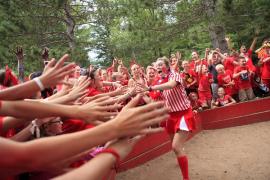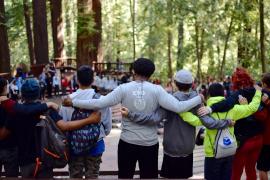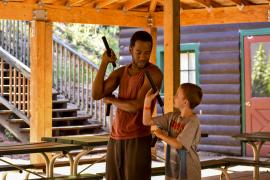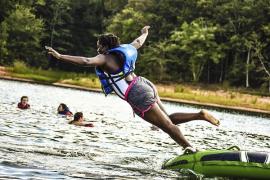Since March, the COVID-19 pandemic has been at the forefront of our minds as cancellations rolled in, and for many people camp looks different this summer. Each summer brings new challenges and this summer is no different, with the additions of a few more challenges and crises than normally expected. The camp community has truly rallied to pivot programming and offer alternatives to a typical camp experience, as virtual programming has emerged as an alternative to an in-person experience. From our most recent online programming experience, we have identified four takeaways for camp directors & frontline staff.
1. Younger staff members as
- Digital natives
- available
- novelty / ingenuity
Recently as part of Camp 4U, an online staff training conference geared toward first-time counselors, we had the chance to turn what would have been short scenario-based skits into TikToks, which we then shared as part of the presentation. The TikToks were much more popular and well-received than the skits would have been, and it was so cool to see our two college-aged team members and camp staff take something new and use it to support camp!
2. Virtual program development can vary
- Short bytes of info
- Longer videos & tailored content
- Social media & marketing help
Virtual programming and content production is not one-size-fits-all by any means, and the first step is truly just to experiment with the resources you have, and go from there. Is there someone on staff who is an aspiring TikTok star? What about an instagram takeover featuring your international staff who might not be able to attend camp this summer? A Facebook Live session of a camp tradition, like a popular skit or activity? Smaller pieces of content can also serve as marketing material after the program has ended, or later in the season as a reminder of what came first!
3. Platforms
- Go big or small
- Existing social media vs. website/software
- Consider your needs, technical abilities & availability of both time & resources
- Consider contacting former staff about instagram takeovers or featuring in videos
Zoom rooms, Google Hangouts, private Facebook groups, Canvas, your own social media page, and the list could go on and on! One of the most overwhelming things about virtual camp is not only the novelty of the situation, but also in the somewhat overwhelming amount of information regarding resources and possibilities. Start small, and focus on one to two platforms and learn what you can about them. Join a virtual camps Facebook page, and see what has worked for other people in your circumstances!
4. Virtual camp is still camp, and camp is about community!
As we move into the summer season, young adults who typically work frontline positions at camp are uniquely positioned to help camp directors and the greater camp community adjust to the new normal of doing camp online. While the loss of an in-person event or experience in which the community can physically be together still hurts, there is opportunity to connect with not just your specific camp community but communities and individuals typically not part of your camp as a result of geography, finances, or another factor. Especially now, both in the role(s) of camp people but also as virtual/online content creation, the opportunity to offer this type of camp experience as a part of the healing process is incredibly important in a time when our hearts and minds can still be together while our bodies cannot.
This blog post was written in support of Project Real Job.
The views and opinions expressed by contributors are their own and do not necessarily reflect the views of the American Camp Association or ACA employees.




